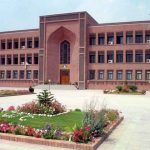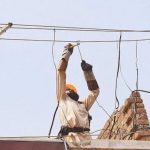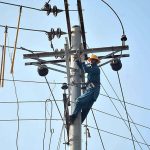QUETTA, Sep 02 (APP): By Abdul Shakoor Khan
A month after being shifted to newly- constructed home, 50 years old Saeeda Bibi, along with her two sons and daughters in law had to make a midnight escape from the flood that submerged entire locality in Nawa Kili area of Quetta city on the last day of monsoon’s eighth spell.
“I was scared all the time and never thought that I, with open eyes will witness perishing of my home that my husband built with hard-earned money,” she recalled the night when her neighbor knocked at their door asking to immediately vacate the house as gushing water of deluge had started washing away homes in the suburbs of main city.
Bibi Saeeda is wife of Mohammad Ashfaq, a retired Deputy Director of Education Department who after receiving gratuity and benevolent fund on his retirement, had constructed his own house on a small piece of land after spending years in rented houses.

“Carrying the Holy Quran, I stayed for a while in the backyard of my home, with my eyes towards sky, praying to Almighty Allah, to save our house and family,” she narrated the saga of a nightmare with tears in her eyes.
“We have been listening that floods had wreaked havoc in green belt of the province, but in the history of Quetta, we had not seen such a disaster as inflicted by recent spells of monsoon,” she added.
This heart-touching story of Saeeda Bibi perhaps helps understand the miseries of those bearing the brunt of devastating flood with their houses and valuables inundated under knee-deep water.

Balochistan province, having the title of almost half of Pakistan had badly suffered from the eight monsoon spells, overwhelming in magnitude and severity. It swept away the kith and kin of the survivors, their cattle, houses and the crops.
“It was unprecedented. We had never even thought of such a disaster,” said 70 years old Abdul Ali, a resident of Pashtoonabad area in Quetta. “I spent my life here. We came across many calamities. But, it was disastrous.”
He appealed to the federal and the provincial governments for an early relief as hundreds of thousands people were forced to stay under open sky direly needing food and shelter.
Director General Provincial Disaster Management Authority Saleh Nasar stated that non-stop heavy downpour, uncontrolled waves of water and gushing hill torrents had so far claimed around 250 lives with thousands injured and displaced.
The catastrophe left some 61718 houses damaged, 145936 livestock dead and about 190 thousand acres of agriculture land badly affected.
“The loss only incurred to the agriculture sector of Balochistan is estimated as Rs 98 billion,” said Director General Agricultural Balochistan Abdul Wahab Kakar. “The flood has damaged crops, orchards, 15800 tube wells, ponds and solar systems on an area of 190,000 acres.”
Lasbella, Bolan, Naseerbad, Jaffarabad, Sohbatpur, Kachi, Jhal Magsi, Kohlu, Dera Bugti, Sibi, Quetta, Pishin, Qila Abdullah, Qilla Saifullah, Lorali, Harnai, Zhob were some of the worst affected districts.
Hundreds of families of Naseerabad division have taken refuge along the highways as their houses are still submerged in the flood water receding very slowly.
Meanwhile, the federal and provincial governments, jawans of Armed Forces, NDMA, Frontier Constabulry and civil society organizations have accelerated the relief operation, daring the challenging situation due to collapse of road infrastructure, connecting highways and bridges.
Balochistan is almost cut off from Punjab, KP and Sindh provinces due to collapse of bridges on Quetta-Zhob-Dana Sar-Dera Ismail Khan road; Quetta-Loralai-Dera Ghazi Khan; Quetta-Khuzdar-Karachi; and Quetta-Sibi-Jacaboad roads.
Although, the authorities have partially restored Quetta-Karachi highway, yet the people have been advised to avoid unnecessary travelling.
“My family is stuck in Dera Murad Jamli area of Naseerabad due to damaged infrastructure and I am helpless to reach there and bring them along,” Abdul
Razaq, a government official in Quetta said.
It is yet another dilemma that most parts of the province is without gas, electricity, internet and cellular services. Rain and floods have damaged two out of the total three fiber optical cables, 24 inch wide gas main pipeline and 132 KV Quetta-Sibi and 220 Dadu-Khuzdar electricity towers rendering people helpless.
“Heavy downpour and floods have incurred losses of over Rs 200 billion to the province,” Chief Minister Balochistan Abdul Qudus Bizenjo said. “The volume of calamity is colossal and we do not have enough resources to fight it, compensate affected population and restore the damaged infrastructure.”
“It may take years to provincial government to repair and rehabilitate the damaged infrastructure,” he told media recently.
“We are in dire need of help to relieve our people from this calamity,” he said urging international financial institutions, donors and humanitarian organizations to lend hand with the federal and provincial governments in relief operation for the calamity-stricken people.
Bizenjo acclaimed Prime Minister Shehbaz Sharif’s personal endeavors for speedy relief as well as announcement of compensation for the affected families as the Prime Minister and Army Chief General Qamar Javed Bajwa personally visited the affected areas to share the grief of affected people.
“The compensation and relief announced for the Balochistan people is welcoming. It will mitigate suffering of the people and help carry on relief operation,” he said.
Though the monsoon spells are over, the misery and plight is not yet. Calamity-stricken people need immediate relief and rehabilitation of infrastructure thereon to bring normalcy to their lives. Let us all join hands in this hour of need.
APP/ask-taj/maz (APP Feature Service)







